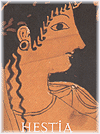 estia, goddess of the hearth, is the eldest daughter of Cronus and Rhea, and a sister of Zeus and Hera. She has her virginity for ever as a privilege granted her by Zeus.
estia, goddess of the hearth, is the eldest daughter of Cronus and Rhea, and a sister of Zeus and Hera. She has her virginity for ever as a privilege granted her by Zeus.
Born to the lofty realm of the gods she remained at the hearth and thus never became involved in the stormy infidelities and adventures of gods and men.
Hestia was regarded as protective, kind, and charitable. She was goddess of domesticity, and invented the art of house-building. Hestia's symbol, the hearth, was revered as the focus of a Greek family where hospitality, good food, warmth, illumination, and spirituality were present. To mistreat a suppliant or guest was an offence against humanity and the goddess.

Hestia was also goddess of the sacred fire of the alter and her public shrines consisted of large hearths with perpetual fires. When men travelled, they often took coals from these fires with them on their journey, the symbol of the goddess providing necessary warmth and light.
Once, Priapus of the megaphallus tried to rape her as she slept, but the braying of an ass (an emblem of lust) awoke her in time. Flinging hot coals at him, Priapus was driven away howling. The ancient Greeks sometimes swore solemn oaths in Hestia's name. The virtuous but staid Hestia was gradually supplanted as one of the twelve Olympian gods in post-Homeric myth by Dionysus, the divine inspirer of revelry.
In Rome, the cult and perpetual flame of Hestia's counterparart, Vesta, was honored by the city's priestesses, the vestal virgins.
Hestia's place as one of the chief gods in the Olympic Pantheon may be due to the Greek's acknowledgment of mankind's fundamental and basic need of fire.
Without fire and toolmaking man could never have built city states and ruled the world.
This is immediately apparent in the story of Prometheus who stole fire from the gods in order to give it to mankind. In the use of fire and the invention of tools man is set apart from all other animals.
The ancient Greeks were well aware of this, and in the importance of these two arts.
In Hestia, who preserves Prometheus's gift, we have an ideal of community and civilisation based upon the best qualities of mankind; charity, good will and the fellowship of others.



